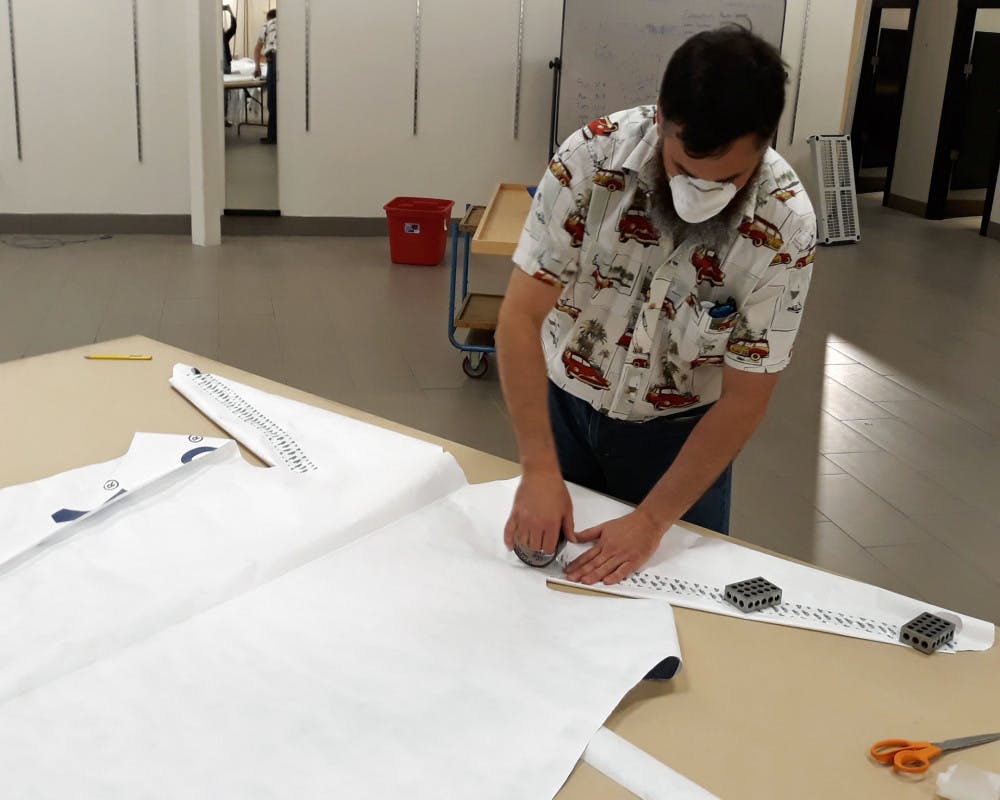
By Riley Currie
In Whatcom County, small businesses and community members are finding creative ways to help ease COVID-19-related shortages of personal protective equipment such as masks, face shields and gowns.
One such project is happening at Bellingham Makerspace, a volunteer-run nonprofit that provides access to creative tools, trades and education. The DIY space is at the center of efforts to organize and distribute personal protective equipment.
“The problem was just not going to get solved,” said Eddy Ury, Climate and Energy Policy manager at Re-Sources, of the shortages.
Ury has been recruiting volunteers and donations for Makerspace. He added that medical industry protocols are unable to handle the current demand, and people are recognizing that this need exists and are stepping up.
When shortages of personal protective equipment began in late March, Bellingham community members immediately began seeking ways to help meet the demands. People formed groups to sew cloth masks to deliver to hospitals. Groups in Bellingham alone produced 12,000 masks.
Bellingham Makerspace saw an opportunity to help when it came to the gear that was more difficult to make at home, like face shields and hospital gowns.
Anthony Distefano, a Makerspace volunteer, designed a hospital gown that could be cut from a sheet of Tyvek. Tyvek is a “100% synthetic material made from high-density spunbound polyethylene fibers,” according to American chemical company DuPont. It’s traditionally used as house wrap during construction.
The gown design was approved by the infection containment department at PeaceHealth St. Joseph Medical Center, and volunteers began producing them immediately.
Brent Richards is Makerspace’s “superstar” volunteer, according to Ury. Richards is also a school bus driver in Ferndale. When he isn’t delivering meals for the school district, he’s working almost full-time at Makerspace, producing the gowns and training new volunteers.
First, a 9-foot sheet of Tyvek is cut to length. The material is then put on a jig, which Richards describes as “like a sewing pattern,” and is cut out using razor blades. Next, it’s laid on a special table, and Tyvek tape is used to tape the seams at the sides.
Once the gowns are made, they’re put on rollaway hangers, and rolled into a room with an ozone generator. The ozone generator removes all oxygen from the room, killing viruses or bacteria. Once they’re sanitized, the gowns are folded and sealed in zip-close bags to be distributed.
“We’re just cranking them out,” Richards said. On April 23, four volunteers (including Richards, who was supervising) produced 70 gowns in just three hours.
“It’s been nice being able to get out and do something, something needed,” Richards said. “Something that might even save lives.”
Organization is vital, according to Mary Elliott, founder and executive director of Bellingham Makerspace. Delivering personal protective equipment to hospitals and high risk people during social distancing also poses a problem.
Elliott set up a Google form through Makerspace to help solve that problem. Anyone can access the form, which lets people request personal protective equipment. Then those with the means to make it can “check off” the need and deliver it, following social distancing measures.
“It cuts down on the bureaucracy,” Elliott said. “If you've got 50 masks that are sewn and ready to go, and you look at the sheet and there’s someone asking for masks, you can just get them to them.”
Mary Elliott founded Bellingham Makerspace in 2014 after her career in pediatric occupational therapy led her to 3D printing. She realized how easy — and useful — creative tools like 3D printers could be. She wanted to find a way to make them more accessible.
“You no longer have to have an engineering degree to use a laser,” Elliott said.
The process for donating and directing supplies to the people who need them has been streamlined in the past few weeks, but funding still presents some difficulties. The larger project of the Tyvek gowns is even more difficult to fund.
As it is now, volunteers are buying the rolls of Tyvek from home improvement stores like Lowe’s or Home Depot. One roll of Tyvek costs about $170 retail, and can produce 18 to 19 gowns.
All the DIY personal protective equipment efforts are volunteer-run, and funding comes entirely from donations.
“It’s a little bit of a mind shift,” Elliott said. She and other volunteers are pivoting from asking for donations of materials to donations of dollars in order to keep this program and others up and running.
The community response has been overwhelmingly positive, according to Elliott.
“Everyone is just stepping up on the fly to do what they can,” Ury said. He’s received well over 100 responses via email from folks asking how they can contribute their time or money.
Small businesses and community members, from gunsmiths to local laundromats, are pooling their material resources to help those on the front lines of the COVID-19 pandemic.
“This stuff is not the future,” Elliott said. “This is here and now.”





